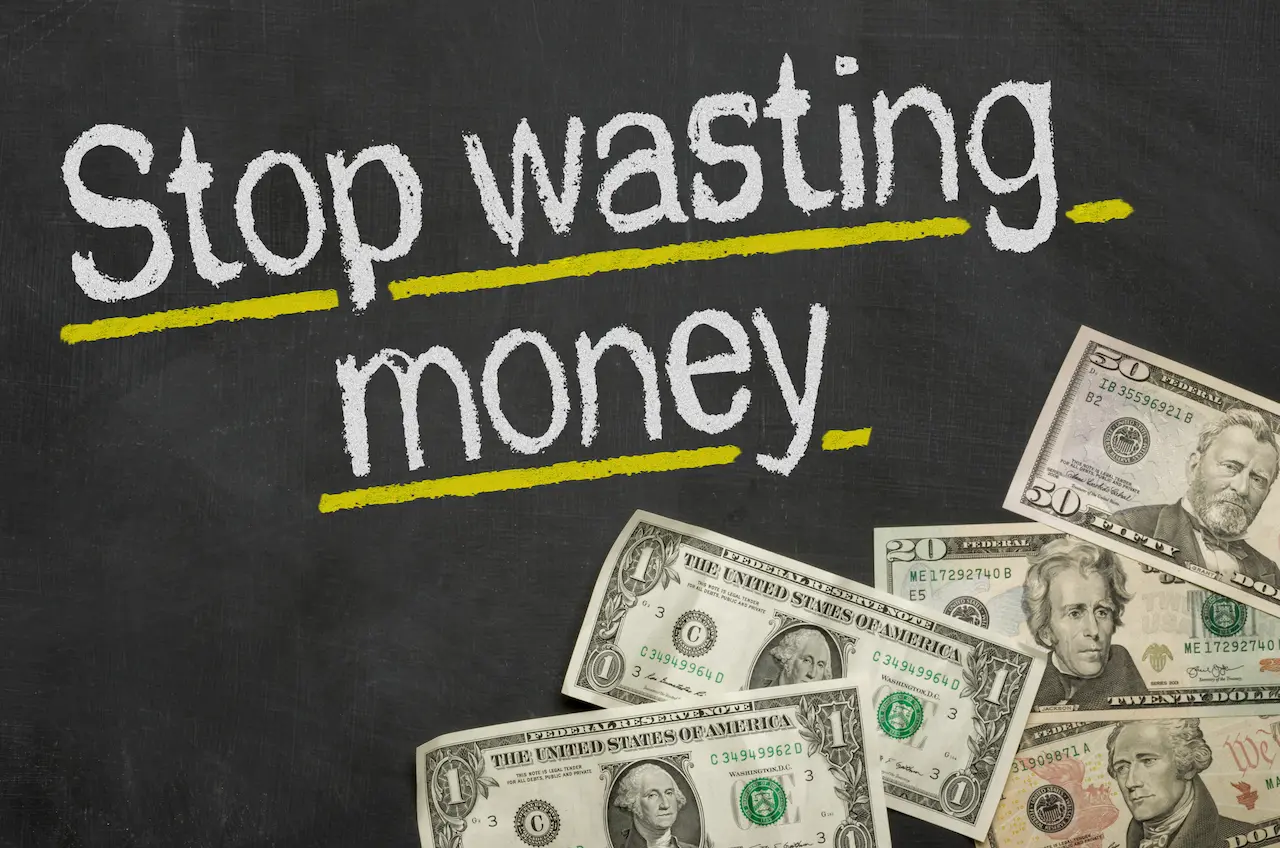Smart Ways to Stop Wasting Money Fast
7 Ways to Stop Wasting Money Before Your Bank Account Crashes
Have you ever wondered what happened to your money when you looked at your bank statements? You did not book a luxurious holiday. You didn’t buy a designer bag. The numbers are not lying. Your account looks smaller than you intended.
[ez-toc]
Many of us spend money without realising it every day. We don’t waste money on extravagant spending sprees but rather in small, everyday ways that slowly eat away at our savings. A few drops of water may not seem much, but when you receive the bill, it can add up.
But don’t worry! Once you know where to look, it’s easy to identify these money traps. With a few simple changes and some discipline, you can stop the leaks, save more efficiently, and get back on track with your finances.
Let’s look at seven ways that you could be wasting your money, and how to fix them fast.
1. Interest on Credit Cards – A Silent Drain
When used responsibly, credit cards can be an excellent financial tool. They can be a great way to save money, but they are also a sneaky way of slipping cash through your fingers. Interest starts to accumulate when you don’t clear your monthly balance. It adds up quickly. What begins as an innocent purchase can soon turn into a costly long-term loan.

If you have a $3,000 credit card balance with a 20% interest rate per year, you may pay up to $600 in interest each year. You’re paying money for the privilege to borrow.
Money Saving Tip:
Use your credit card as a debit card. Spend only what’s in your account, and make sure to pay off the balance each month. You may want to consider a balance transfer at 0% if you are already having trouble paying off your credit card.
2. ATM fees – Paying to Access Your Own Money
It’s easy to get cash at the ATM right around the corner. If it’s not a bank machine, you may be charged a fee, anywhere from $2 to $5 for each withdrawal. If you do this a few times a week, that’s $20 per month. This is $240 per year, money that could be used for groceries, school supplies, or a rainy-day fund.
Saving money tip:
Only utilize ATMs in your bank’s network. Plan your week. Keep your cash in a secure place and withdraw larger amounts of money once or twice. Use the apps offered by many banks that display nearby ATMs with no fees.
3. Death by $10 notes – Buying Lunch and Coffee Daily
It’s easy to buy a coffee from a barista and a sandwich at lunch. Sometimes, it is even necessary. If you do it every day, the cost can add up faster than you might think. A $4 coffee, a $12 meal five days a week, equals $80. This is $320 per month, or nearly $4,000 annually!
Not to mention the extra croissants or smoothies you bought on impulse.
Money Saving Tip:
Cook meals in bulk on Sundays and portion them out into reusable containers. Every day, you’ll be able to pack a nutritious and delicious lunch. Invest in an inexpensive thermos or travel cup and bring your coffee. Reduce your purchased lunches by two days per week.

4. Utility Bills – Paying the “Loyalty tax”
Electricity. Gas. Internet. Mobile. Mobile phones are not luxuries, but everyday necessities. If you’ve had the same provider for many years, you may be paying more than someone new. Many companies offer special introductory rates to new customers, but quietly increase the rate for loyal clients. The “loyalty fee” is a tax that costs you money.
Money Saving Tip:
Reviewing your bills twice a year is a good idea. Compare websites for the best deals and switch providers if necessary. You can often get a discount by simply asking your provider, “What is the best deal that you can offer me now?” If not, you shouldn’t hesitate to leave.
Bundling services can be a good option. You could combine the internet, phone, and streaming into one service provider to get a lower fee.
5. Sneaky Subscriptions: Set and Forget Your Money
It’s easy to sign up and forget about a trial offer, only to be charged a monthly fee for something that you never use. Consider streaming services, fitness software, and even mystery boxes for dogs.
You might think that paying $12.95 here and $9.99 there is not much, but if you forget to renew your subscriptions, it could cost you hundreds of dollars a year.
Money Saving Tip:
Review your bank statements to identify any recurring charges. You can cancel anything that you are not using. Set up calendar reminders for monthly subscription reviews, particularly before trial periods expire. You can even use apps like Truebill and PocketSmith to identify and cancel unwanted subscriptions.
6. Late Fees – The Most Avoidable Expense Ever
It’s frustrating to be penalized for paying late. Not just with utility bills. Parking tickets, late library books, missed credit card payments, and even late rent are all things to consider.
The amount of late fees can rapidly snowball, and they are almost always completely avoidable.
Money Saving Tip:
Set up direct debits or automated payments for your regular bills. Calendar alerts, lists of to-dos, or budgeting apps can help you remember upcoming deadlines. Consolidate your monthly payments if you tend to forget. If you miss a payment, call your provider. Many will waive the fee for the first time.
7. Missing Expert Advice – Not Asking For Help
Most people think that mortgage brokers, personal loan consultants, and financial planners are for the wealthy. Getting the right financial advice could save you thousands.
Brokers are experts in finding the best deals, whether it’s refinancing your mortgage to a lower interest rate, consolidating debts with high interest rates, or finding a personal loan that is more flexible.
Money Saving Tip:
Do not be afraid to seek help. Consult a broker, like those at Savvy. They can help you uncover options that you may not have discovered on your own. The best part is? The lender is often responsible for paying their fees, and not you.
You can put your money to better use the sooner you get advice. This could be by increasing your emergency fund, buying a home, or booking a much-needed holiday for your family.

Daily Habits That Could Be Hurting Your Wallet
Check out these additional pitfalls:
Impulse buying:
The cute things you see in the middle aisle at Aldi? Or the email with the flash sales? These are designed to make you feel tempted. You should pause before clicking the “buy now” button.
Overbuying Foods: Have you ever thrown out limp lettuce or expired dairy products? Plan your meals, make a list,s tnd stick to it. Avoid shopping when you are hungry.
Do not ignore loyalty programs:
When used correctly, reward points can be converted into real cash or discounts. Don’t spend too much to “earn rewards” – it defeats the point.
Conclusion
It’s not about being irresponsible, but about failing to notice the small drips that are affecting your finances. Once you identify these leaks, you can fix them quickly and easily.
Fixing these bad habits doesn’t involve a drastic lifestyle change. It’s not necessary to become a hermit or stop drinking coffee in the morning. All it takes is awareness, planning, and intention.
Once you have a few dollars extra in your account every month, what do you do? The fun begins then, whether you use it to pay for a dream vacation, add money to your emergency fund, or buy that item you’ve wanted for months.
Your money should work for you, not just disappear. Let’s stop wasting money and start making it work for you.



